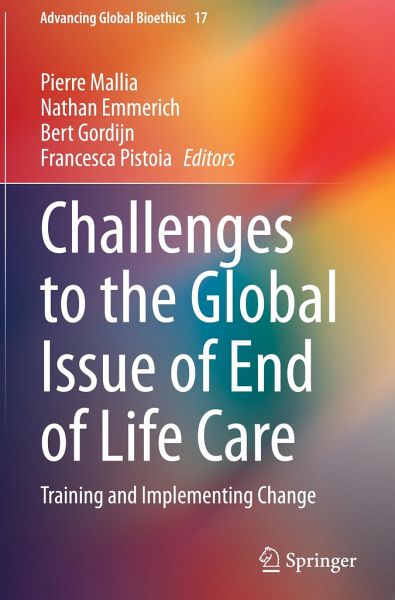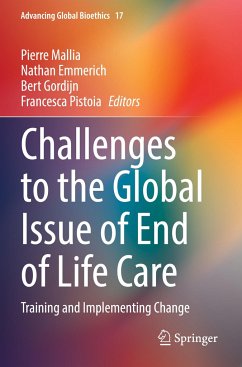Pierre Mallia is Professor of Family Medicine and Patients' Rights in the Faculty of Medicine & Surgery at the Medical School, Mater Dei Hospital, where he also coordinates the Bioethics Research Programme. He is Consultant in Clinical Ethics at Malta's main hospital 'Materi Dei'. He is Chairperson and founder of the Medicine & Law Programme of the Faculty of Laws within the same university and a Visiting Professor at the Laennec University of Lyon, France. He is Chairman of the Health Ethics Committee of the Department of Health and recently has been made Chairperson of the National Bioethics Consultative Committee of the Ministry of Health, where he has been advisor to the several consecutive Ministers. He has recently been also appointed Chairman of the Faculty Research Ethics Committee (FREC) of the Faculty of Medicine & Surgery at the University of Malta. At the moment he is the Principal Investigator and holder of the Erasmus + EndCare project, which is studyingissues and problems of applying pathways at the end of life. He represents the University of Malta as the Principal partner, along with two other partner countries (Italy and Ireland) and experts from the UK, Ireland, France, Iran, Toronto, USA, and the Pontifical Academy for Life of the Vatican. He is planning a second project which will involve Patient Groups and Palliative Care organisations. He has published over eighty articles in international peer reviewed journals and also several books including on by Sringer-Nature, on The Nature of the Doctor Patient Relationship. He has contributed Chapters to Springer's Encylopedia of Global Ethics (3 Vols), and to, Springer's Handbook for global ethics (4 Vols), Edited by Professors Henk Ten Have and Bert Gordijn. Nathan Emmerich is a Senior Lecturer in Bioethics at the Australian National University. Based in the Medical School he is the lead for Professionalism and Leadership in Phase one of the M.Ch.D. Previously he has been a postdoctoral research in the Institute of Ethics at Dublin City University, and a Visting Research Fellow at Queen's University Belfast. Whilst at DUC he was part of a project on ethics and end of life care and his recent publications have focused on this area. More generally, his research falls under the broad rubric of Bioethics. His background is in philosophy and 'applied ethics', his interests are interdisciplinary. Bert Gordijn is Professor and Director of the Institute of Ethics at Dublin City University in Ireland. He has studied Philosophy and History in Utrecht, Strasbourg and Freiburg in Breisgau. In 1995 he was awarded a doctorate in Philosophy from the Albert-Ludwigs-Universität Freiburg, followed by a doctorate in Bioethics from the Radboud University Nijmegen in 2003. Bert has been a Visiting Professor at Lancaster University (UK), Georgetown University (USA), the National University of Singapore, the Fondation Brocher (Switzerland), and Yenepoya University (Mangalore, Karnataka, India). He has served on Advisory Panels and Expert Committees of the European Chemical Industry Council, the European Patent Organisation, the Irish Department of Health and UNESCO. Bert is Editor-in-Chief of two book series: The International Library of Ethics, Law and Technology and Advances in Global Bioethics as well as a peer reviewed journal: Medicine, Health Care and Philosophy, all published by Springer Nature. He is Secretary of the European Society for Philosophy of Medicine and Healthcare and President of the International Association of Education in Ethics. Dr. Francesca Pistoia completed her degree summa cum laude in medicine and surgery, and thereafter specialized in neurology summa cum laude, at the University of L'Aquila. She earned a PhD in Internal Medicine and Applied Immunology at the same University. Currently she holds the position of Assistant Professor of Neurorehabilitation at the University of L'Aquila. So far, she has contributed to 95 papers (83 in peer-reviewed international journals and 12 on italian journals); 80 papers are indexed in Pubmed). She also presented her results at national and international congresses (resulting in 71 abstracts and communications). H-index (Scopus): 21. Her research is mainly focused on the topic of diagnosis, prognosis and rehabilitation of patients with severe brain injury with the aim of implementing validated assessment tools to identify physical, cognitive and behavioural disabilities and quantify rehabilitation-related outcomes. Research topics include: the evaluation of patients with disorders of consciousness (vegetative state and minimally conscious state) as a consequence of severe brain injury: her studies in this area have been aimed at evaluating the neurobiological and behavioral factors, which may influence the recovery of consciousness, and the implementation of new therapeutical approaches including brain computer interfaces; the identification of disorders of motor imagery and the perception of emotions in patients with locked-in syndrome. She also contributed to research addressing the epidemiology of cerebrovascular diseases and of Parkinson's disease in population-based registries, and the role of comorbidities in headache pathogenesis and of behavioral therapies in patients with chronic headache. She serves as a member of the Ethical Committee of the University of L'Aquila.














